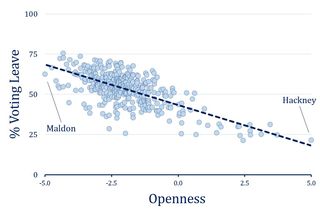Bastian Jaeger of Tilburg University in the Netherlands has mined a British data set for clues about voters' decisions as to whether their country should remain in the EU or leave. His findings are an interesting and perhaps surprising reminder that even broad personality dimensions sometimes predict specific behavioral acts, voting being the archetypal political act. As a cautionary note it needs to be pointed out the the unit of analysis here is the county and not the person, that is, the correlations are obtained after considerable aggregation. Here is Bastian's report.
On June 23, 2016, the British people cast their vote in a historic referendum: Remain a member of the European Union or sever ties with the continent. It came down to the wire but the Leave campaign was able to rake in a narrow victory. 51.9% voted against remaining a member of the European Union and for the Brexit, as the decision has been referred to. In the end, the difference was less than 1.3 million votes (about the population of Dallas). Who were the people backing the Leave vote? Journalists were quick in breaking down the results to show that older, less-educated people from rural areas were largely in favor of leaving.[1] However, next to demographics like age and education, political preferences are also influenced by our personality. So can we use basic personality traits to predict who voted for leaving the EU?
A brief history of the EU
The European Union was originally set up as an economic community in the 1950s with the UK joining in 1973. Over the years, more and more legislative decisions were delegated from London, Paris, and Berlin to Brussels where most EU buildings are located. In its current state the EU is still far away from a United States of Europe (what Winston Churchill envisioned after the Second World War), but the UK has always been particularly skeptical of Brussels’ oversight. When the majority of EU members adopted the euro as their common currency, the United Kingdom stuck to the pound sterling.
In the UK, the continuous inflow of refugees has led to increased dissatisfaction about forced compliance with EU law. This development resulted in the call for a referendum. While topics like immigration and trade dominated the debates, what the British voted on in the end were the essential values of the European community. After all, being a member of the EU is an all-or-nothing deal. An open market means economic growth but also common rules and regulations. Open borders mean passport-free travel but also access for immigrants. Europe stands for peace and freedom, bureaucracy and compromise. In the end, a narrow majority of the British people rejected these ideas.
More open-minded Brits voted against the Brexit
How do personality traits relate to the Brexit decision? Think of your personality as a complex and multi-faceted structure. Researchers have shown that it can be broken down into a handful of basic dimensions. The so-called Big Five — Openness, Conscientiousness, Extraversion, Agreeableness, and Neuroticism — are thought to reflect the core of your personality. Thanks to a recent effort by Peter Rentfrow and his colleagues at the University of Cambridge and the University of Helsinki, data on regional differences in Big Five traits is available for England, Scotland, and Wales.[2]
Of the Big Five, Openness seems to be the prime candidate to capture European values which stand for opening national boarders to free movement, trade, and immigration. Openness describes “the breadth, depth, originality, and complexity of an individual’s mental and experiential life”.[3] Open people tend to be curious and unconventional; they welcome new experiences; they are open-minded and creative. Previous research in the political domain has linked high levels of Openness to tolerance and the endorsement of liberal views.[4]

A look at the referendum results in each of the 380 Local Authority Districts (LADs), shows that Openness is strongly correlated with voting behavior (r = -.67). Areas with very open-minded citizens don’t want to leave the union. Put differently, a 1 point decrease on the Openness scale (ranging from -5 to 5) results in a 5 percentage point increase in the Leave vote.
Take Maldon and Hackney for example. People in the sea-side town of Maldon, Essex have on average the lowest Openness scores. Their vote clearly went to the Brexit

camp with 62.6% voting to leave the European Union. The picture looks quite different if you travel west for one hour. Hackney is located in the north-east of London. It features hipster cafés, an unusual museum displaying clown faces painted on chicken eggs,[5] but also the most open people in the UK. Only 21.4% of its residents elected to leave the EU. This shows that an area’s vote in the referendum is strongly related to the open-mindedness of its residents.
Using personality measures to predict voting behavior
Naturally, political preferences are not only influenced by our personality but also by other factors like age or socio-economic status. Some demographic groups were particularly disappointed with the result of the referendum because they were mostly in favor of remaining a member of the EU. The majority of Scotland voted Remain. Young, urban, and highly educated voters also tended to be in favor of staying in the EU. These groups also score higher on Openness. So can a vote be predicted by your belonging to certain demographic groups and personality doesn’t play a role after all? The data say no. Even when taking a number of demographic variables into account (age, gender, urban vs. rural, highest level of education, employment rate and being Scottish),[6] Openness still predicts voting behavior. The effect decreases by about two-thirds, but still explains a considerable part of the results.[7]
What about the other Big Five traits? When we compare the unique predictive power of all five traits (while still controlling for our demographic variables), Openness shows the strongest effect, followed by Agreeableness and Conscientiousness. Areas with more agreeable (good-natured and modest) residents tended to vote against the Brexit. Since agreeable people are typically more cooperative and trusting, their Remain vote could reflect a pro-immigration attitude (one of the most controversial topics of the referendum). In contrast, areas with more conscientious (disciplined and cautious) residents voted Leave. This is not surprising as research has linked Conscientiousness to preferences for conformity, orderliness, and other conservative values. Neuroticism and Extraversion did not predict voting behavior.[8]
Don’t condemn the Brexit voters yet
What consequences the Brexit vote will have remains to be seen. The current situation is uncharted territory for both the UK and the European Union as no country has ever left the EU before. However, the results from the British referendum offer insights into how voting decisions are influenced by basic personality traits. Regional differences in Openness across 380 areas in the UK strongly predict how people voted in the referendum. Areas with more open-minded residents are against leaving the European Union. Of the Big Five personality traits, Openness is by far the strongest predictor and the effect persists when controlling for a variety of demographic variables like age, education, and population density.
The voting decision of a specific person is based on many factors such as their personality, age, and socio-economic background, to name just a few. The reported results are based on a large sample. However, all variables were measured at the regional level which means that data was aggregated across different individuals. Thus, the results cannot tell us much about the individual decision process. Group-level relationships might not hold at the individual level (a reasoning error known as the ecological fallacy)[9] and it should not be concluded that all Brexit voters (or the residents of Maldon) are narrow-minded, conventional, and intolerant.
In addition, the broad dimensions of the Big Five are often not telling the whole story. In fact, recent research led by Mark Brandt at Tilburg University has shown that people high on Openness are sometimes not so open-minded after all. While they were more tolerant of minorities, people high and low on Openness were equally intolerant of other groups posing a threat to their worldviews.[10] This example shows that more nuanced approaches are needed to uncover the complex relationship between our personality and political preferences.
Notes
[1] http://www.theguardian.com/news/datablog/2016/jun/24/the-areas-and-demo…
[2] Rentfrow, P. J., Jokela, M., & Lamb, M. E. (2015). Regional personality differences in Great Britain. Plos One, 10(3)
[3] John, O. P., Naumann, L. P., & Soto, C. J. (2008). Paradigm shift to the integrative Big Five trait taxonomy. In Handbook of Personality: Theory and Research (pp. 114–158).
[4] Gerber, A. S., Huber, G. A., Doherty, D., & Dowling, C. M. (2011). The Big Five personality traits in the political arena. Annual Review of Political Science, 14, 265–87
[5] http://clowns-gallery.wix.com/clowns-gallery#!egg-collection/ndh2e
[6] This data was taken from the 2011 UK census. It is available at: http://webarchive.nationalarchives.gov.uk/20160105160709/http://www.ons…
[7] When the 6 continuous variables (all except being Scottish) were standardized to compare the magnitude of their effects, the resulting order was (from largest to smallest effect): percentage of residents with level 4 qualification or higher, median age, Openness, percentage of female residents, population density, and unemployment rate. All 7 variables accounted for 88% of the variance in voting behavior.
[8] The zero-order correlation coefficients for the other four traits are -.42 for Extraversion, .30 for Conscientiousness, .27 for Neuroticism, and .22 for Agreeableness.
[9] Pollet, T. V., Tybur, J. M., Frankenhuis, W. E., & Rickard, I. J. (2014). What can cross-cultural correlations teach us about human nature? Human Nature, 25(3), 410–429.
[10] Brandt, M. J., Chambers, J. R., Crawford, J. T., Wetherell, G., & Reyna, C. (2015). Bounded openness: The effect of openness to experience on intolerance is moderated by target group conventionality. Journal of Personality and Social Psychology, 109(3), 549–568.
Bastian Jaeger is a PhD student at Tilburg University in the Netherlands interested in how people make decisions. He studies whom we trust, who we vote for, and who gets picked last in gym class.




